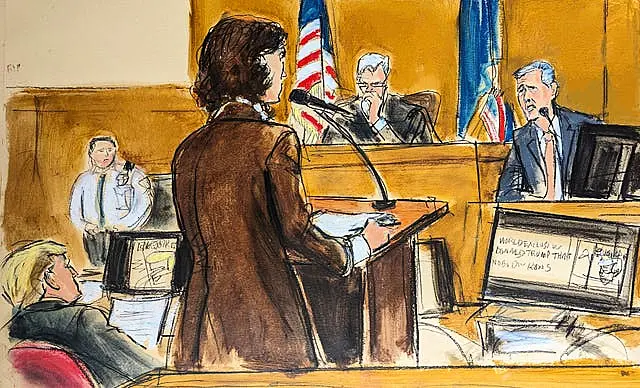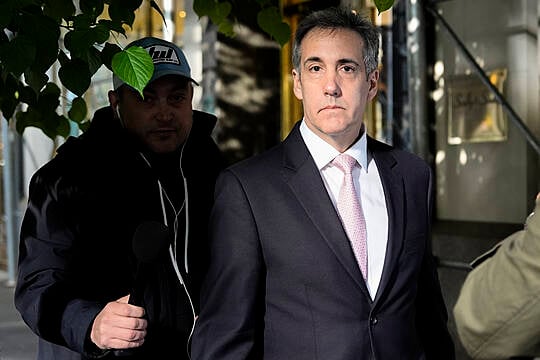Donald Trump’s fixer-turned-foe awaits a bruising round of questioning from the former president’s lawyers on Tuesday after giving evidence that linked the celebrity client to all aspects of a hush money scheme.
Mr Trump, the first former US president to go on trial, was joined in the Manhattan courtroom by an entourage that included House Speaker Mike Johnson, who claimed the case was politically motivated by Democrats.
It was a remarkable moment in American politics as the second in line to the presidency used the office’s powerful pulpit to attack the US judicial system, and sought to turn his political party against the rule of law by declaring the trial illegitimate.
Mr Trump was also joined by North Dakota Governor Doug Burgum, Florida Reps Byron Donalds and Cory Mills as well as his former GOP rival Vivek Ramaswamy.
Mr Burgum and Mr Donalds are considered potential vice presidential contenders.
“I do have a lot of surrogates, and they’re speaking very beautifully,” Mr Trump said outside the courtroom as they stood in the background.
Their presence on Tuesday as Michael Cohen, the prosecution’s star witness, returns to the stand was a not-so-subtle show of support meant not just for Mr Trump but also for voters tuning in from home and for the jurors who are deciding Mr Trump’s fate.
Mr Cohen returns to the stand on Tuesday where a day earlier he delivered a matter-of-fact testimony that went to the heart of the former president’s trial.
“Everything required Mr Trump’s sign-off,” Mr Cohen said.

He placed Mr Trump at the centre of the hush money scheme, saying he had promised to reimburse money the lawyer had fronted for the payments and was constantly apprised of the behind-the-scenes efforts to bury stories feared to be harmful to the campaign.
“We need to stop this from getting out,” Mr Cohen quoted Mr Trump as telling him in reference to porn actor Stormy Daniels’ account of a sexual encounter with Mr Trump a decade earlier.
The then-candidate was especially anxious about how the story would affect his standing with female voters.
A similar episode occurred when Mr Cohen alerted Mr Trump that a Playboy model was alleging that she and Trump had an extramarital affair.
“Make sure it doesn’t get released,” was Mr Cohen’s message to Mr Trump, the lawyer said.
The woman, Karen McDougal, was paid 150,000 dollars (£119,490) in an arrangement that was made after Mr Trump received a “complete and total update on everything that transpired”.

“What I was doing, I was doing at the direction of and benefit of Mr Trump,” Mr Cohen said.
Mr Trump has pleaded not guilty and has denied both sexual encounters.
Mr Cohen is by far the prosecution’s most important witness, and though his testimony lacked the electricity that defined Ms Daniels’ turn on the stand, he nonetheless linked Mr Trump directly to the payments and helped illuminate some of the drier evidence such as text messages and phone logs that jurors had already seen.
The testimony of a witness with such intimate knowledge of Mr Trump’s activities could heighten the legal exposure of the presumptive Republican presidential nominee if jurors deem him sufficiently credible.
But prosecutors’ reliance on a witness with such a chequered past — Mr Cohen pleaded guilty to federal charges related to the payments — also carries sizable risks with a jury and could be a boon to Mr Trump politically as he fundraises off his legal woes and paints the case as the product of a tainted criminal justice system.
The men, once so close that Mr Cohen boasted that he would “take a bullet” for Mr Trump, had no visible interaction inside the courtroom.

The sedate atmosphere was a marked contrast from their last courtroom face-off in October, when Mr Trump walked out of the courtroom after his lawyer finished questioning Mr Cohen during his civil fraud trial.
This time around, Trump sat at the defence table with his eyes closed for long stretches of testimony as







